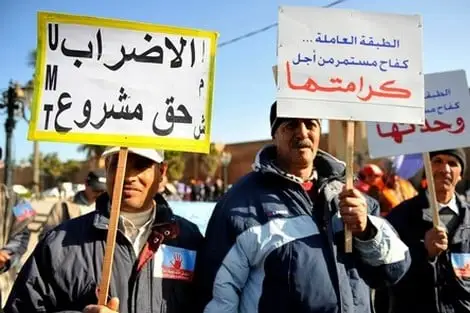In its opinion on the draft organic law No. 97.15 concerning the regulation of the conditions and procedures for exercising the right to strike, the National Human Rights Council (CNDH) has expressed its approval of applying the principle of “no work, no pay” and deducting the wages of strikers, while emphasizing the need to respect proportionality and outline specific exceptions.
The council recommended ensuring proportionality between the length of the work stoppage and the amount deducted when applying the “no work, no pay” principle. It also stressed the importance of specifying cases where this principle should not be applied, particularly when the reason for the strike is non-payment of wages by the employer. Additionally, the council called for adherence to proper administrative procedures before making any deductions.
The council considered that Article 14 of the draft law, which treats absence from work due to participation in a strike as a case of non-performance of work and thus subject to wage deductions, aligns with Articles 6 and 32 of the Labor Code. It also conforms to the accounting rule stipulated in Article 41 of Royal Decree No. 330.66, dated April 21, 1967, which states that wages are not paid until work is performed.
The council noted that the deduction of wages for strikers is based on Law No. 12-81 regarding the deductions from the salaries of state employees and local government workers who are unlawfully absent from work, as well as its implementing decree. The relevant article stipulates that salaries of employees who are absent without permission or legitimate justification are subject to deductions, with the exception of family allowances, according to defined conditions.
The National Human Rights Council confirmed that the Court of Cassation had previously issued rulings supporting the legality of deducting wages from strikers, in line with the “no work, no pay” principle. It also clarified that this approach is consistent with the standards set by the Committee on Freedom of Association, which considers that deductions during strike periods do not contradict the principles of trade union freedom.
Moreover, the council pointed out that the Committee on Freedom of Assembly has stated that wage deductions for strike days raise no objections from the standpoint of freedom principles. However, legal jurisprudence has indicated that this measure is acceptable when workers submit their demands, but in cases of strikes resulting from wage delays, violations of trade union freedoms, or demands for the application of the law, this principle should not be applied.
The council highlighted that the French legislature has adopted this exception, where the “no work, no pay” rule is canceled if the strike results from a major failure on the part of the employer, including failure to pay wages.
